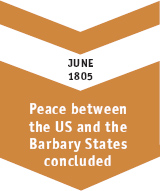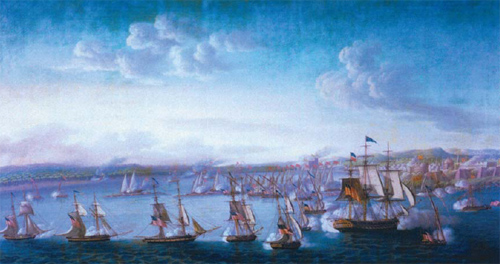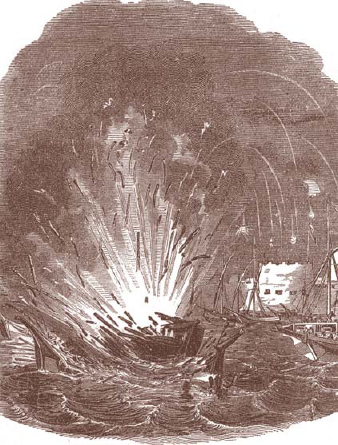
With the destruction of Philadelphia, the war against the Barbary States tipped in favor of the United States. Until peace was concluded in June 1805, Yusuf Karamanli was forced to stand on the defensive, and he lost more than he gained. In exchange for a payment of $60,000, he released all prisoners, including those captured when Philadelphia surrendered in October 1803. Tripoli forfeited receipt of any future annual payment in the treaty, which left it in a worse position than prior to the war – when the United States paid an annual tribute. The $60,000 was significantly less than Tripoli would have received from the United States during the two years of warfare.
Decatur became a national hero because of the raid. On Preble’s recommendation, Decatur was promoted to full captain by Congress. Capable and competent lieutenants like Stewart, Hull, and Porter – who had been senior to Decatur – found that he jumped over them in the ranks. Decatur’s promotion caused remarkably little public hostility, however, regardless of what private resentments might have been felt.
All of the other officers who participated in the raid, including Stewart, did benefit. They were marked as rising stars, capable men deserving of consideration. Except for Jonathan Thorn – killed while on leave of absence between the Second Barbary War and the War of 1812 – all had been promoted to at least commander by the start of the War of 1812. Stewart joined Decatur as a captain in 1806, promoted due to his outstanding performance throughout the entire Second Barbary War.
Nor was Salvatore Catalano forgotten. Congress conferred US citizenship upon him for his part in the raid. A more concrete reward came from the US Navy, which awarded him a master’s warrant – the highest non-commissioned rank in the service. He remained in the US Navy until his death in 1846, having moved to Washington DC in 1806.

Ironically, in view of his role in the raid’s success, Catalano is one of the few leaders of the raid not to be honored by having a US Navy warship named after him. In World War II, a flotilla could have been assembled from the destroyers named after participants. Every lieutenant – except for Joseph Bainbridge, overshadowed by older brother William and cursed with a dismal post-Barbary War career – was so honored. Even Surgeon’s Mate Lewis Heerman merited a namesake destroyer, as did the majority of the midshipmen participating. Of the midshipmen, Macdonough would go on to command the victorious American flotilla at the battle of Lake Champlain during the War of 1812, and Charles Morris would serve as first lieutenant of Constitution during its duel with HMS Guerrieré.
The officers of Philadelphia also had successful careers following their release. William Bainbridge expiated a record of being the only US Navy officer to surrender three ships by capturing HMS Java in a frigate duel during the War of 1812. Porter commanded Essex on its epic cruise to the South Pacific during that war. Jacob Jones as a master-commandant captured the brig HMS Dolphin and sloop-of-war HMS Frolic in the same conflict.
Preble was one of the major reasons that Karamanli eventually concluded an unfavorable peace. He kept up the pressure on Tripoli throughout his tenure as commodore of the Mediterranean Squadron. He led attacks on Tripoli in July, August, and September of 1804. The first set of attacks in July tested Tripoli’s defenses. It was followed in August by a massive assault by the US Navy, which included a bombardment of the port with both the 24-pdr guns of the frigates Constitution and President, and 13in mortars launched from bomb ketches. President, a sister ship to Constitution, had been dispatched from America after Philadelphia’s loss, and the ketches had been lent to the United States by the Kingdom of the Two Sicilies. The bombardment cost Tripoli much of the naval force guarding the port and caused great damage to the city and its fortification. It led to an initial peace offer by Karamanli, but Preble found the terms unacceptable. Preble continued pounding Tripoli for the rest of August, but failed to force Karamanli to offer better terms.

On August 4, 1804, Preble’s squadron bombarded Tripoli. Enterprise is the schooner on the left of the column of ships at the rear. Syren is fourth from the left. (USNH&HC)
One consequence of Decatur’s raid was that it encouraged other junior officers to seek promotion through bold action. Often these men lacked Decatur’s ability to determine the line that separated audacity from foolhardiness. So it proved in September. Lieutenant Richard Somers approached Preble with a fresh scheme to use Intrepid. Somers proposed fitting out the ketch as a fireship. This “floating volcano” would be sailed into Tripoli harbor, and lighted among the various corsair vessels docked there, in the belief that most could be burned.
Preble, wanting to increase pressure on Tripoli, agreed to the attempt. As with Decatur’s attack, Intrepid was filled with volunteer seamen and eager officers. Yet this raid was less focused and less organized than Decatur’s attack. Somers did not take Catalano – or any pilot familiar with Tripoli’s harbor – even though the attempt required the ability for Intrepid, filled with combustibles and explosives, to bluff its way into port.

On September 5, 1804, Intrepid was again used to penetrate Tripoli to attack its navy. This attempt ended badly, with Intrepid destroyed in a catastrophic explosion, killing all aboard. (AC)
The result was absolute failure. Intrepid was detected as it sailed in, and destroyed in a spectacular explosion, although it remains uncertain what caused the detonation. Some observers argued that Intrepid was fired to prevent capture by a Tripolitan gunboat. Others believe the explosion was triggered by a shot from a shore battery. The 13 men aboard Intrepid were all killed. The attack illustrates the peril that Decatur faced on his attempt to burn Philadelphia. Had his purpose been detected before reaching the frigate, Intrepid would likely have been destroyed in an identical manner six months earlier.
Preble was relieved by James Barron later that fall. He returned to the United States in winter 1805, and was honored by Congress for his Mediterranean accomplishments with a medal in March 1806. Ill health forced his retirement in 1806, and he died in August 1807.